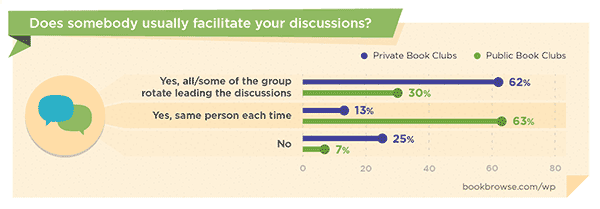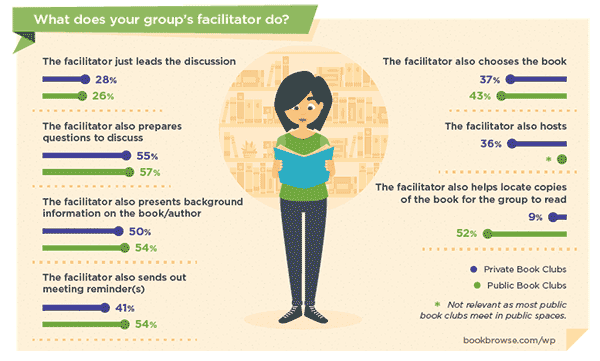A friend of mine recently contacted me because her in-person book club is moving online during the COVID-19 pandemic and she's worried about making the transition, particularly as, while she loves her group, their discussions have a tendency of devolving into friendly chit-chat at the best of times.
I asked her if her group had considered designating a facilitator - someone who, generally speaking, helps the group get the most out of their discussions by being prepared, keeping things on track and making sure that everyone's voice is heard. She said they had, but that she felt some trepidation as to how to be an effective facilitator, particularly while also navigating an online discussion forum - did I have any suggestions?
Here are the tips I shared with her:
More than three-quarters of book clubs have a facilitator with most groups rotating the role, but if somebody doesn't feel comfortable facilitating there's no rule that says everyone has to take a turn.
Side note: according to BookBrowse's Inner Lives of Book Clubs report, facilitators frequently take on organizational duties (see the chart at the bottom), but be careful that the facilitator doesn't take on too much! In some book clubs, particularly in public groups such as those organized by libraries, we found that administration falls largely or completely on one person and that many leaders would like to see the load shared more equally (and conversely, some members of these groups would like to have a greater say in the group).

Look for questions that make people think or draw out personal opinions, and generate good conversation (and remember, yes-or-no questions are a big snooze). Your preparation will help keep the conversation on track and add depth to the discussion. Be ready to introduce new topics when the discussion of the previous one seems to have run its course or is going off track, and don't feel that you have to cover every topic you've prepared.
If you choose to create the topics/questions yourself, jot down notes, poignant quotes and page numbers while you read so they're handy for the meeting (more ideas here). If you need a little inspiration, BookBrowse offers thousands of recommended book club titles, and each has a discussion guide. You can also check out our online discussions to discover which topics have generated the most (and the best) conversations.
Book club members say:
"At one point we were getting off track too often, so we decided we should each come with a question or two to keep the discussion centered on the book."
"We were not spending long discussing the books. This has been resolved by having talking points ready to stimulate the discussion."
Background information on the book or author can deepen and enhance the reading experience. Find out what inspired an author to write a particular book, or learn more about the underlying history, culture or context behind the book. Explore BookBrowse's author interviews and "beyond the book" articles, which provide digestible amounts of information that inform without overwhelming.
Book club members say:
"I expand my knowledge of the world and grow as a person by being exposed to different ideas."
"This group educates me, challenges me to think differently & listens to my point of view."
As the facilitator, it's sometimes easy to fall into the role of lecturer. After all, if you've spent time doing research and worked hard preparing for the meeting, you'll naturally want to share what you've learned. But it's your responsibility to encourage the exchanging of ideas among everyone, and all opinions deserve to be heard. Break the ice and guide the conversation when necessary but be willing to sit back and let the conversation flow. And if things get heated or tense, make sure that everyone is still treating each other with respect. You don't want anyone feeling attacked, belittled or dismissed.
Talking about personal experiences and how they relate to a particular book can enhance a group's discussion, but it is all too easy to get sidetracked. Before you know it you're talking about a grandchild's choir concert or someone's yoga class, and the book discussion is lost in the mix, to the tacit disappointment of all. In your role as facilitator, you should be recognized as an authority among friends and have the ability to bring the discussion back on track without being seen as "bossy".
Book club members say:
"Some people offer too much personal information that at the start relates to the book and then they get off track and others join them."
"There are always a couple of people who go a little too deep with their personal experience and how it seems to relate to the book. It frustrates some of us."
According to BookBrowse's research, more than one-third of all book clubs report having an "overly dominant personality" - i.e. someone who, whether intentionally or not, talks too much and doesn't give others an equal opportunity to participate. As the facilitator, you can ask for others to speak up and create the space needed for quieter members to jump in. You also carry the authority to gently mediate any conflict that might arise. For more on this topic, see the article, What to Do When a Book Club Member Talks Too Much.
Book club members say:
"As the facilitator, I carefully rein in the dominating ones while still allowing them to jump in. It is done delicately and sometimes with a bit of humor."
"We start each meeting by going around the room asking what each person thinks of the book. This allows the quieter ones to have their say."

Interestingly, according to our research, book clubs with facilitators report higher levels of satisfaction with their overall experience: 75% of those in facilitated groups reported feeling "very happy" in their book club, compared to 65% in groups that are not facilitated. Book clubs that do well without a facilitator tend to be either those that lean more towards being social groups, or ones where the membership have spent time establishing ground rules so that all participants feel confident redirecting the discussion when needed.
But even groups that do just fine without a facilitator in person might benefit from someone in the role when chatting virtually. For example, it's easier for people to talk over each other online so that nobody can hear, and you'll want to be on the lookout for those who want to express their thoughts on a topic but haven't had a chance to speak, and call on them directly. In some cases, you might want to ask each person if they want to share their thoughts on a topic (starting with a different person each time) before opening the discussion up to the group as a whole.
For More on Virtual Meetings:
Part 1: Zoom Book Club Meetings: The Pros and Cons
Part 2: Discussing Books on Zoom, the Pros and Cons
See also BookBrowse's book club advice pages, which are useful resources for both new and established groups; and other blog topics based on our Inner Lives of Book Clubs research.